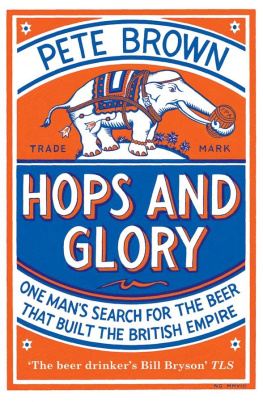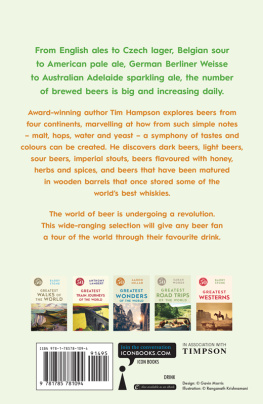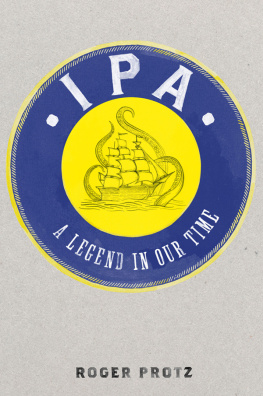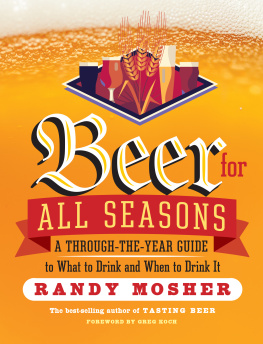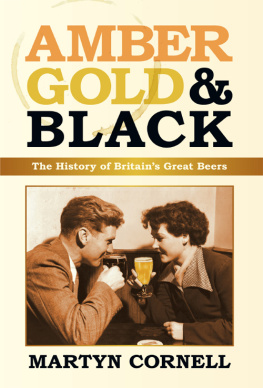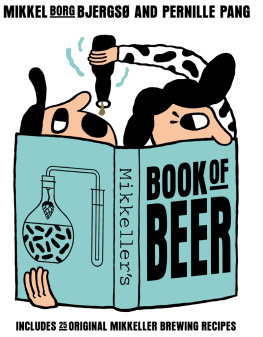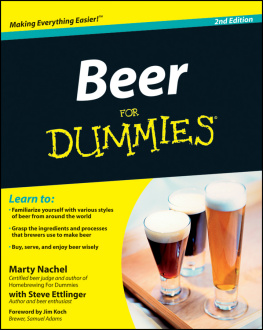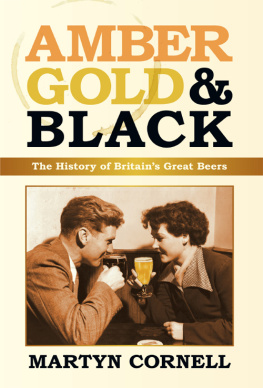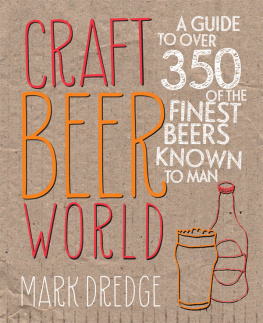Pete Brown used to advertise beer for a living before he realized that writing about it was even more fun, and came with even more free beer. He contributes to various newspapers, magazines and beer trade press titles, writes the annual report on Britains cask ale market, sings beers praises on TV and radio, and runs an influential blog.
In 2009, Pete was awarded the Michael Jackson Gold Tankard Award and named Beer Writer of the Year by the British Guild of Beer Writers.
(No, not that Michael Jackson, the other one).
For Liz,
with profound and sincere apologies,
for reasons that will become acutely obvious
to the attentive reader
We are not here to sell a parcel of boilers and vats, butthe potentiality of growing rich, beyond the dreams of avarice.
Samuel Johnson,
after arranging the sale of his late friend Henry Thrales breweryto Barclay Perkins for 135,000
If I were asked under what sky the human mind hasmost fully developed some of its choicest gifts, has mostdeeply pondered on the greatest problems of life, andhas found solutions, I should point to India.
Max Meller,
nineteenth-century orientalist
I cannot tell you where you should look for meif you send out any pinnace to meete me. I live at thedevotion of the wind and the seas.
From a letter by James Lancaster,
Commander of the Companys first fleet, to the Directors ofthe Honourable East India Company, 1601
Acknowledgements
With each book I write, I seem to call upon more people to do more for me. For my next trick, Id like to write a book that doesnt put anybody out, doesnt upset anyone, doesnt require anyone to do anything except lean back and enjoy a beer and a chat. Id love to think that I might one day succeed.
This is the story of a voyage thats no longer possible according to the people who know best. Urs Steiner at Station Weggis made it possible.
Getting on the ships was only part of it though. I lived at the mercy not only of the winds and the seas, like James Lancaster, but also of customs officials, bureaucrats, pirates, scammers, touts and my own incompetence and misfortune. Its still a very big world out there, and I travelled through it and through the history of India and IPA far more comfortably, far happier, and far more successfully than I had any right, thanks to Vikram Achanta, Pamela Brown, Pratyush Chalasani, Melissa Cole, Dennis Cox, William Dalrymple, Mark Dorber, Klaas Gaastra, Chris Gittner (who comes from a family of punsters and thought of the name for this book), Robert Humphreys, Ashish Jasuja, Rupert Ponsonby, Roger Protz, Dave Ryder, Cilene Saorin, Graham Smith, Viking Afloat and WERNER.
Special thanks must go to Jeff Pickthall, who saved the whole thing when it would otherwise have fallen apart, and who is now an international beer smuggler as a result.
At the end of the journey, it had a proper finale thanks entirely to Janet and Robin Witheridge of the British Beer & Pub Association, who went far beyond the call of duty for someone they hadnt even met when they set off for India, aided very kindly by Simon Wilson and the Deputy British High Commission in Kolkata.
Back home, thanks to Janet Sherry for navigating me from the events described in chapter thirty-four to the real end of the journey.
The reason for going on the voyage was to bring a legend back to life. If I managed to succeed in this object, then Steve Wellington and Paul Rudge must be regarded as co-authors of this book. Their passion and commitment to make this project work equalled my own. They were involved because they work for Coors. But they went to the lengths they did to help me because they are great people, unrivalled in their passion for beer, and by the end, great friends. Paul Hegarty, Jo White, Ian Ward and Lisa Needham at Coors also gave invaluable help, and I was privileged to be given free rein in the archives at the Visitor Centre before it was mothballed thanks to Roger Sellick, Peter Orgill and all the archivists who helped me there. I dont like everything that Coors do, but as an organization they fully supported Rudgie and Steve in supporting me, and probably spent as much money as I did myself in helping to make it happen. Im sure they did this in the hope that it will create some favourable publicity for them, and I hope it does they deserve it. They didnt have to help as much as they did, and as a corporation they made this whole enterprise possible.
Thanks to my agent, Jim Gill, for instantly saying Yes its a no-brainer as soon as he heard the idea, and Pan Macmillan for doing the same when he took it to them. Thanks particularly to Jon Butler who had the daunting task of wrestling the manuscript down from a completely unworkable length, and to Dusty Miller for her enduring enthusiasm and support beyond the call of duty.
Three weeks before I started the engine on Remus, Michael Jackson (aka the Beer Hunter not, as he liked to point out, The Gloved One) died. I came relatively recently to the world of beer writing, and I cant claim to have known him well, much as I would like to. I was present at the same dinners and drinks receptions as he was for several years, but he was always surrounded by a dense cluster of acolytes and fans, and though I always told myself I just didnt want to be a sycophant, the truth is I was too nervous to approach him. I think we had maybe three proper conversations in total, but when we had one of them he inscribed a copy of the latest edition of his Guide to the Beers of Belgium with a dedication that means a lot to me. Most of us who write about beer would not be doing so and many of the beers we love wouldnt be around if it hadnt been for his passion and his ability to communicate it to others. I set off for Burton days after his funeral, and in the time before I left a couple of people who were with him shortly before he died told me that hed heard of what I was trying to do, and supported my doing it. That knowledge helped toughen me up at times when all I wanted to do was book a flight home. Id like to dedicate this book to Michaels memory.
And that this would definitely rule out a next-life reconciliation. Id be willing to have a go at overcoming the physical incompatibility, but the salt water would do for me in an instant.
Cheers.
Pete Brown
London
2008
CONTENTS
PROLOGUE
DOG WATCH
Oh, you contrary old bitch, how do you keep doing this?
I throw my weight against the wheel, spitting obscenities at the sails as they flap and harrumph against the dense stars. The sails shouldnt be flapping or harrumphing, for that matter and its my fault they are.
Neither my bulk nor my foul mouth have any effect on the compass its still mocking me with a heading of two-oh-five degrees. I push harder at the wheel, turning it two spokes at a time. For some reason itll spin and rattle without effort to port, but insists on making a sluggish and obstinate grind of any correction to starboard. My wrecked arm starts to complain yet again, wondering why shooting pains from wrist to bicep are not a strong-enough hint for me to give it a rest. Denis, the Slovenian police judge with whom Im sharing my 2 a.m. stint at the wheel of an ancient ship, languidly leans over and lends a hand, easing her round.
Soon the wheel has gone through a full rotation and the rudder meter indicates almost ten degrees to starboard. I can sense Europa pretending not to notice, trying to ignore me. And then slowly, grudgingly, she starts to move back to her correct course.
Every time you move the wheel, it takes about two hundred feet twice the length of the ship for it to work through and affect the course. So as the compass nears two-two-five degrees, which is the course I should be steering, I spin the wheel back rapidly, bringing the rudder to zero. The Grand Old Lady, as ever, has ideas of her own. Even though Ive now put five degrees back to port on the rudder, shes gallivanting off up past two-thirty... two-forty...
Next page
